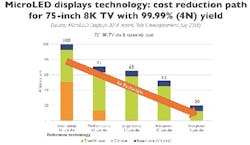"MicroLED displays could potentially match or exceed OLED performance in all critical attributes," says Eric Virey, senior technology & market analyst at Yole Developpement (Lyon, France).Attributes include brightness, contrast, color gamut, refresh rate, viewing angle, ruggedness and durability, resolution and pixel density, lifetime, and power consumption. Yole and its partner Knowmade, both part of Yole Group of Companies, released two microLEDs reports to reveal the status of the technology and give a deep understanding of the industry, the companies involved, and the related supply chain. MicroLED Displays 2018 and MicroLED Displays: Intellectual Property Landscape are now available.
Sony's demonstration of a full HD 55 inch microLED TV at CES 2012, more than six years ago, was the first exposure for microLED displays and generated a lot of excitement. Since Apple acquired Luxvue in 2014, many leading companies such as Facebook, Google, Samsung, LG, or Intel have entered the game via sizable internal developments, acquisitions, like those of mLED and eLux, or investments in startups such as glō or Aledia.
Analyzing Apple's microLED patent activity shows that the company essentially halted its filing around 2015. This is a surprising finding in the light of the fact that the consumer electronics giant has maintained a large project team and consistently spent hundreds of millions of dollars annually on microLED development. A closer analysis however brought up the name of a possible strawman entity used by Apple to continue filing patents and shows that the company is still advancing key aspects of microLED technologies.
"Despite a later start compared to pioneers such as Sony or Sharp, Apple's portfolio is one of the most complete, comprehensively covering all critical technologies pertinent to microLEDs," explains Virey. "The company is the most advanced and still one of the best positioned to bring high volume microLED products to the market. However, it also faces unique challenges," he adds.
Apple can't afford to tarnish its brand and introduce a product featuring such a highly differentiating technology that would be anything but flawless. Moreover, it requires high volumes, which makes setting up the supply chain more challenging than for any other company. In addition, it has no prior experience in display manufacturing and due to its need for secrecy, must develop pretty much everything internally, duplicating technologies and infrastructures that others have the option to outsource…
The smartphones sector is a good example to illustrate the leadership of Apple. Indeed smartwatch volumes could reach 100 million units by 2027 and Apple remains the single largest smartwatch maker, explains Yole's analysts in the microLED reports.
SOURCE: Yole Developpement; http://www.yole.fr/MicroLEDDisplay_PatentLandscape_APPLE.aspx#.W77GOvlRfDd

Gail Overton | Senior Editor (2004-2020)
Gail has more than 30 years of engineering, marketing, product management, and editorial experience in the photonics and optical communications industry. Before joining the staff at Laser Focus World in 2004, she held many product management and product marketing roles in the fiber-optics industry, most notably at Hughes (El Segundo, CA), GTE Labs (Waltham, MA), Corning (Corning, NY), Photon Kinetics (Beaverton, OR), and Newport Corporation (Irvine, CA). During her marketing career, Gail published articles in WDM Solutions and Sensors magazine and traveled internationally to conduct product and sales training. Gail received her BS degree in physics, with an emphasis in optics, from San Diego State University in San Diego, CA in May 1986.
